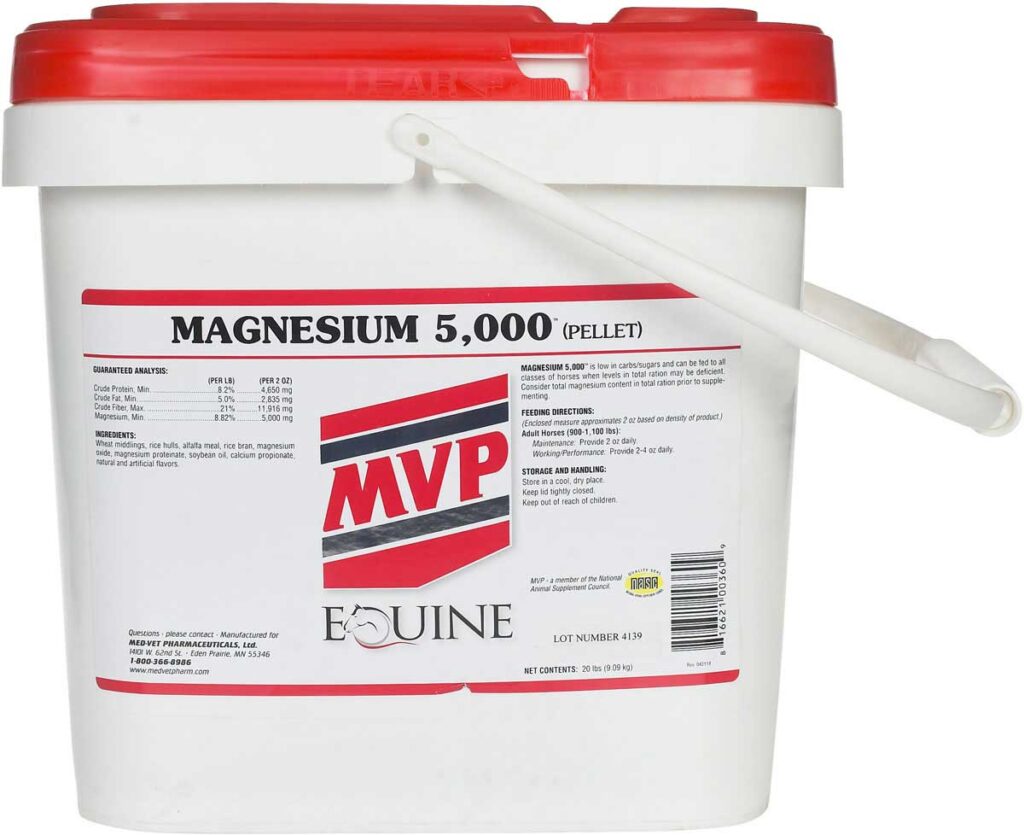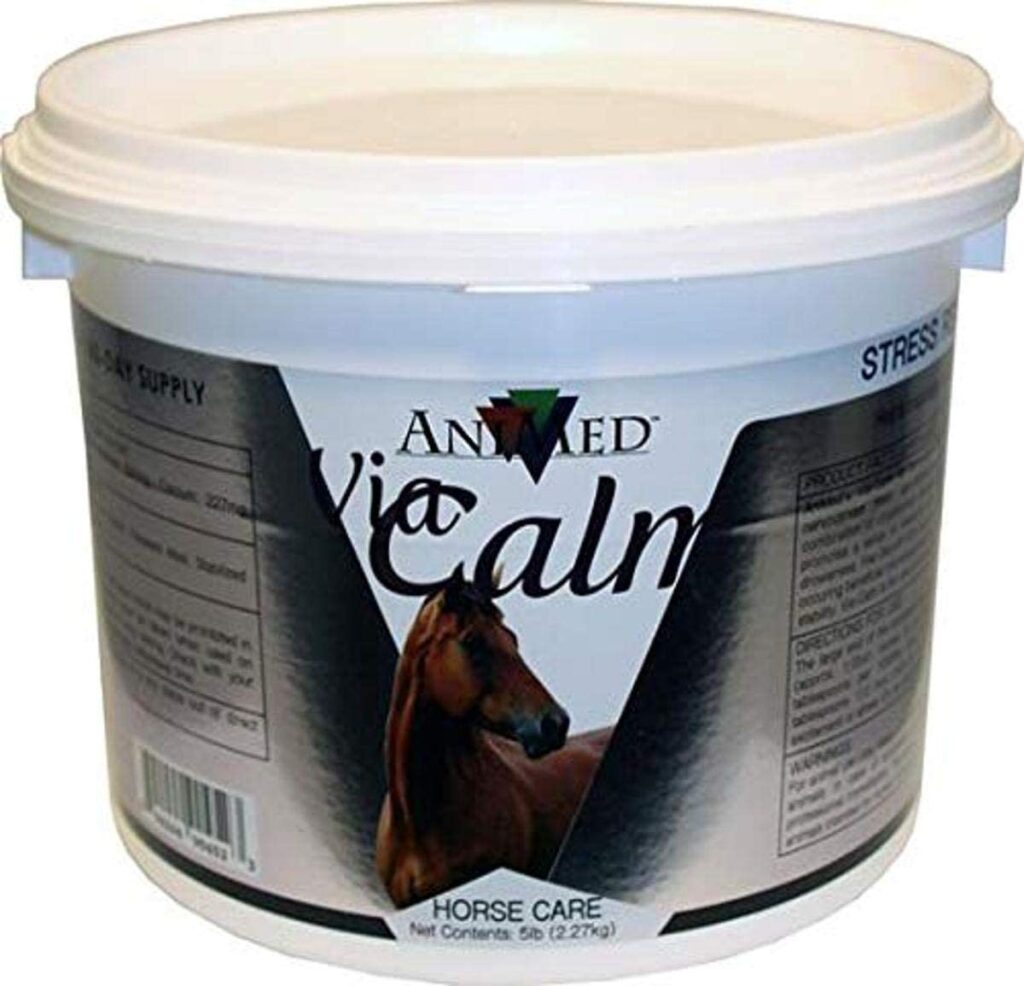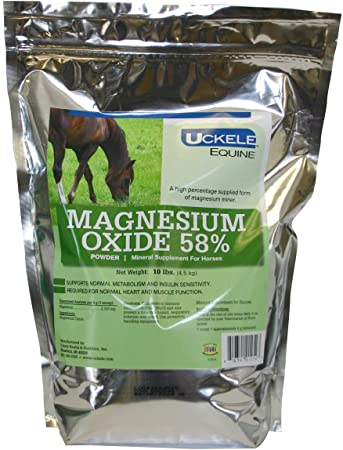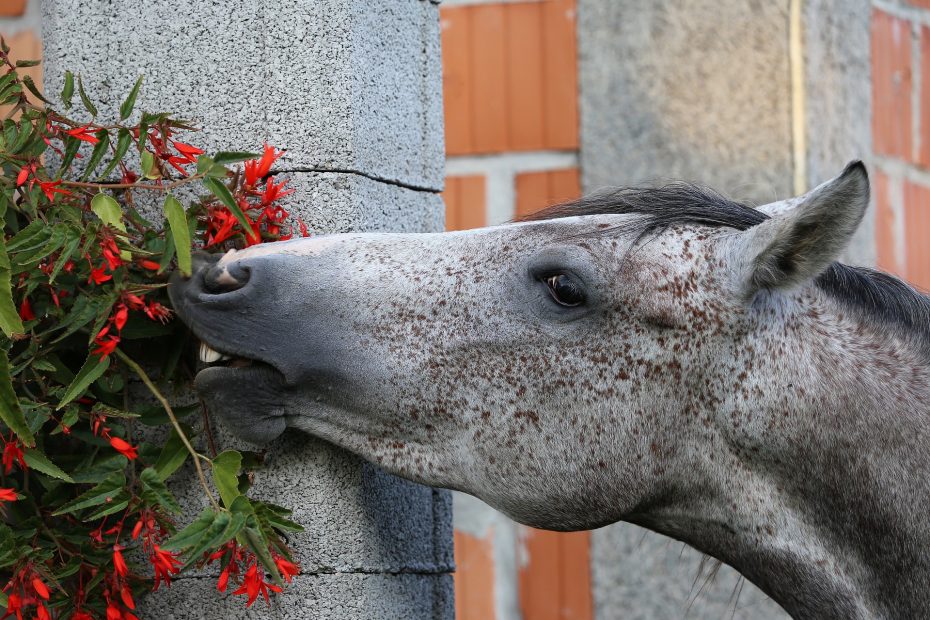Equine nutrition is just as important as human nutrition. Learning and understanding what fuels your horse and keeps them healthy is a crucial part of being a horse owner.
What role does magnesium play in your horse’s health?
An Overlooked Element
Magnesium is an important element in your horse’s health that is easily overlooked. Magnesium plays an important part in nerve and muscle function. Horses lacking in this important element can show signs of nervousness, wariness, excitability, and muscle tremors.
How Magnesium Affects Horses
Magnesium affects horses much as it affects humans. Calcium works with magnesium to control muscle contractions in the horse’s body. This happens very rapidly.
When there is not enough magnesium in a cell, calcium can leak back in and cause a stimulatory effect, which will not allow the muscle to relax completely. This can cause chronic stress on the body and issues with nerve regulation. Magnesium is required for proper nerve and muscle function.
Does Magnesium Calm Horses?
Magnesium is sold, even to people, marketed as a “calming” supplement. Some say magnesium can even calm a nervous horse; you might be surprised that balancing the nerve function of the horse may make them much calmer — and this can be achieved through magnesium.
Many people would not know a nervous horse could simply be suffering from a magnesium deficiency.
Supplementing with magnesium can potentially calm a nervous horse that is experiencing symptoms due to magnesium deficiency. The majority of feed supplements containing magnesium for horses are marketed for their calming effects. Experimenting to see if these supplements help your horse is your best option. Let your horse be the judge.
Find out if magnesium works for spooky horses here.
Behavior Changes In Horses Due to low Magnesium Levels
Magnesium is often the most neglected mineral in horse feeds. Many horses may exhibit behavior changes in the spring due to magnesium-deficient grasses. Some horses are not noticeably affected by this, while others experience erratic behavior. Adding magnesium to their diet may have a calming effect and help to level out behavior. Some horses have been written off as having behavior problems when they really had an unknown magnesium deficiency.
Some Signs of Magnesium Deficiency in Horses
- Unable to relax physically or mentally
- Muscle tremors or twitches
- Body tension
- Bucking or rearing midway through a ride for no apparent reason
- Would be described as ‘thin-skinned’ or over-sensitive to sound or movement
- Massage and chiropractic adjustments do not have lasting effects
- Teeth grinding
- Irregular heartbeat or pounding heart
- Random spooking, running away, inconsistent from one ride to the next
- Angry about being brushed, blanketed, touched, or palpated on either side of the spine
- History of tying up
- Fatigue
- Painful heats in mares
What kind of magnesium should I use?
There are many forms of magnesium for horses. There are injectables, oral supplements, and transdermal applications. The most popular are oral forms of magnesium oxide for horses.
There are many oral forms of magnesium; the most popular option is Di-magnesium malate. Another option is magnesium citrate. Horse owners should avoid magnesium sulfate because of its laxative effect. These come in pre-mixed supplements that you can add to grain or feed. They are appealing and palatable to your horse.
One example is: “Med-Vet Magnesium 5000.” This is just one commercially available brand available here. Also, check out Amazon.com and search for “Equine Magnesium Supplement.” Read reviews and consult trusted people in your equestrian network to find what works best.
The Best Magnesium Supplements For Horses
Below you will find a list of our favorite magnesium supplements for horses.
Largest portions: Med-Vet Magnesium 5000 10lb, 20lb, or 40lb

Check Price on Amazon for 10lb or 20lb pail.
Check Price on Amazon for 40lb pail.
Med-Vet Magnesium is a classic choice. On Amazon, it has a 5-star rating and can be used as support for:
- Anxious/Nervous Behavior
- Blood Sugar/Glucose Metabolism
- Muscle Function
- Immune System Function
MVP Magnesium 5000 provides concentrated magnesium to support your horse’s healthy bodily processes, including muscle, heart, and nervous system function. This feed supplement is in pellet form and is an NASC member.
If you’re not sure about starting off with a new supplement, MVP 5000 comes in portions as small as 10lbs and up to 40lbs.

Most Popular: Via-Calm 5 lb Pail
Check price for Via-Calm 5lb on Amazon.
Via-Calm is easily one of the most popular choices on Amazon, with over 350 reviews. Another huge perk for first-time horse magnesium users is that it comes in a small pail for a reasonable price. This way, you don’t have to commit to a lot of magnesium if it doesn’t work out in the long run for you and your horse.
Most Economical: Uckele Magnesium Oxide 10lb

Check price for Uckele Magnesium Oxide 10lb.
While Via-Calm’s supplement is already reasonably priced, if you just pay about $5 more, you can get twice as much magnesium supplement by weight. That makes Uckele’s magnesium our favorite choice for anyone looking to get the best “bang for their buck.”
Dosage of magnesium for horses
The magnesium requirement of a typical horse was put at 13 milligrams per kilogram of body weight per day. Horses that are growing, lactating, or in training for competition will require more daily. Be sure to check depending on the type of magnesium and the supplement that you use. If you buy a pre-made magnesium supplement, read the label and follow the instructions. If in doubt, consult your veterinarian or local feed store.
Horses showing severe signs of deficiency may also require more. Every horse is different and will have a dose that works best for maintenance. Pay attention to the change in symptoms in your horse when making dosage decisions.
The dose will also vary depending on times of environment, stress levels, if you are competing with your horse, the weather, and pasture content. When signs of deficiency begin to subside, the dosage can be tapered off. Be sure to keep monitoring your horse after tapering off to be sure that symptoms and behavior changes don’t start again.
Know the Signs
How do you know how much magnesium your horse is getting? It’s very difficult without a tool to tell us how much magnesium is in daily feeding. Many feed supplements only give you an estimate or a percentage of mineral content. One way to prevent magnesium deficiency in your horse is to familiarize yourself with the signs. Toxicity is extremely rare. Prevention is the best cure. Feed your horse a balanced diet and work to ensure his or her health needs are met routinely.
How Much is Too Much?
Magnesium toxicity is rare because excess is naturally excreted. Once a horse becomes low on magnesium, it is challenging to get their magnesium levels back up without supplementation. That said, if using a pre-made commercial product, follow the instructions on the package label.
Magnesium for horses has become a hot topic. It is best to do your own research and make decisions about magnesium supplementation based on your horse’s needs. If you feel your horses are experiencing any of the above-listed symptoms that might indicate a deficiency, it’s best to talk to your vet.
Rule out other medical causes of behavior issues or issues with muscle or nerve health. If you determine that the cause of your horses’ symptoms may be related to magnesium deficiency, read reviews and consult experts to choose the best option for supplementation.
Knowledge is power when it comes to the best magnesium supplement for horses. Adding in a magnesium supplement for your horse may improve your horse’s calmness and help to curb erratic behavior. These benefits make supplementing with magnesium a great add-on to your horse’s nutrition program.
Sources:
